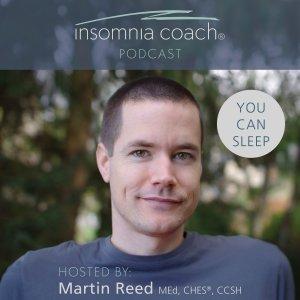Insomnia Coach® Podcast

A conversation about CBT-I with sleep physician Daniel Erichsen (#5)
Daniel Erichsen is a sleep physician of eight years and is currently practicing in Eugene, Oregon. He is also the man behind BedTyme, a CBT-I based iPhone app, host of the Insomnia Insight YouTube channel and podcast, and author of two books; Sleep 101 and Why We Don’t Sleep. In this episode, Daniel explains why he is such a believer in CBT-I and why eight hours of sleep is not an appropriate goal to aim for. We also discuss the barriers that make it harder for people with insomnia to improve their sleep, how to cope with setbacks when implementing CBT-I techniques, and the problem with melatonin and other supplements for insomnia. My online insomnia coaching course will give you all the skills and support you need to enjoy better sleep for the rest of your life. Click here to get the course. Click here for a full transcript of this episode.Click here to hide the transcript. Martin Reed: Welcome to The Insomnia Coach Podcast. My name is Martin Reed. I believe that nobody needs to live with chronic insomnia and that cognitive behavioral therapy for insomnia (CBT-I) techniques can help you enjoy better sleep for the rest of your life. Martin Reed: All right, so Daniel, thank you for being here with me today. Daniel Erichsen: Thank you, I'm just so excited to be here, really. Martin Reed: It's great to have you. So first of all, can you tell us a bit more about how you got into sleep, and a bit more about your day-to-day work with your sleep patients? Daniel Erichsen: Absolutely, so I'll start quickly from way in the beginning, my dad's a doctor, my mom's a nurse, so I just kind of fall in that medical footsteps, and eventually found myself doing pediatrics actually, in the Bronx, New York. I was doing well, but I knew I wanted to do some kind of sub-specialty, some kind of fellowship, and I didn't really know what to do. I initially thought I was going to do something really intense, like pediatric-intensive care, but I realized that was not for me. And it was really a friend of mine just said, "Oh Daniel, do you know that there's a fellowship in sleep medicine?" That made me really curious, because I always liked higher functions, like what it... I was really curious about like, what is the purpose of sleep, why do we sleep? And so that's how I applied and got into sleep fellowship. Daniel Erichsen: And what happened was, I was really fortunate because my fellowship director was, he taught us CBT, very basic, but they taught us CBT. So I thought it was interesting, started practicing, and then I realized that A, it works, it helps people, but B, it's like, nobody's heard about it. And then I got more and more interested in really working with insomnia, but that's how I got into sleep and insomnia. Martin Reed: Mm-hmm (affirmative). And so CBT, which we know is cognitive-behavioral therapy, and it's slightly modified for insomnia, like specifically for people with insomnia. Do you practice CBT-I techniques like, on a daily basis with people that you see in-clinic? Daniel Erichsen: Yeah, it's rarely that a day goes by without me doing some CBT. I work in a sleep clinic, a pretty typical sleep clinic, meaning the bulk of what we see is sleep apnea, I would say, probably 70 to 80% of patients are referred to us because they have sleep apnea. That said, there's a good... The other 30%, a lot of people are insomnia, but out of those people that were referred because they have sleep apnea, when we get a history, a lot of them really have insomnia. So I say definitely between one to four patients a day is like, straight-up CT, yeah. Martin Reed: And so, when you learned about CBT-I, what was it about it that resonated with you, like, before you've actually started to implement it yourself?






 Visit Podcast Website
Visit Podcast Website RSS Podcast Feed
RSS Podcast Feed Subscribe
Subscribe
 Add to MyCast
Add to MyCast